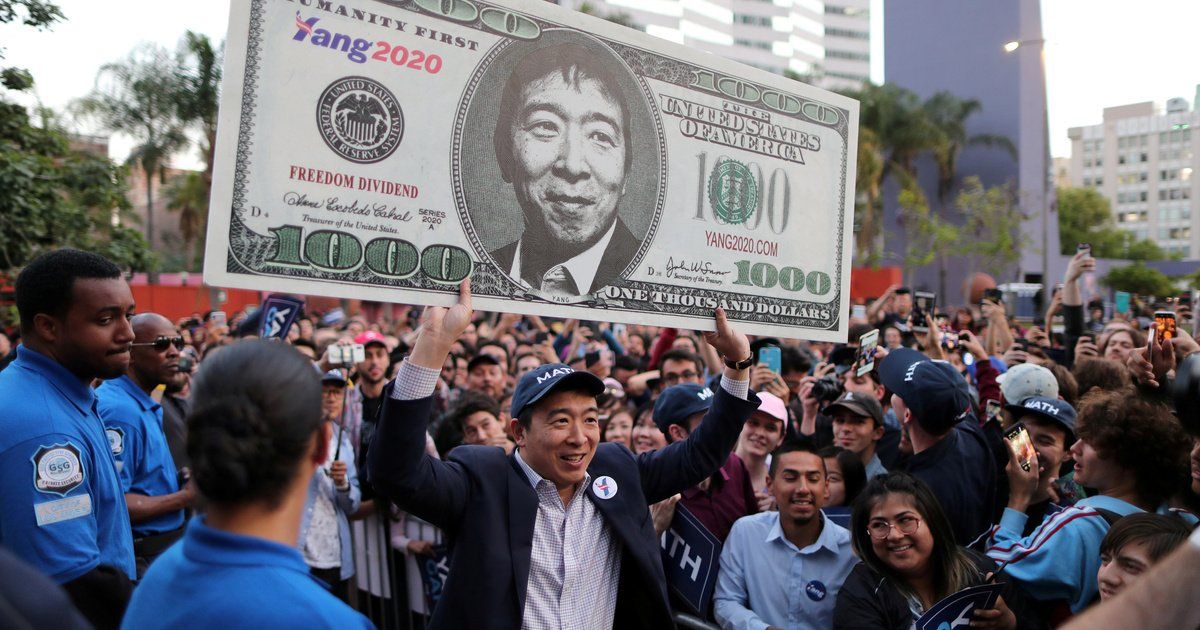How Andrew Yang’s Universal Basic Income proposal stacks up to others in the US and abroad

A few minutes every morning is all you need.
Stay up to date on the world's Headlines and Human Stories. It's fun, it's factual, it's fluff-free.
Many cities around the US and the globe have announced their own plans to implement UBI for their citizens, potentially paving the way for bigger projects in the future.
Businessman Andrew Yang was largely unknown when he entered the Democratic primary for president in 2019, but he quickly gained popularity for proposing a form of Universal Basic Income (UBI), which he termed the “Freedom Dividend.”
Now, Yang is running for mayor of New York City as something of a celebrity, bringing with him an altered version of the UBI that brought him the attention – and support – of so many.
With tens of millions of Americans living in poverty even before the COVID-19 pandemic, the concept of UBI is more popular than ever. Many cities around the United States and the globe have announced their own plans for implementing versions of UBI for their citizens, potentially paving the way for bigger projects in the future.
Yang the presidential candidate vs Yang the mayoral candidate
In his presidential run, Yang introduced the “Freedom Dividend,” his large-scale version of UBI. The Freedom Dividend would provide every adult over the age of 18 with US$1,000 a month. According to Yang’s campaign website, the UBI would allow “all Americans to pay their bills, educate themselves, start businesses.”
Additionally, Yang claims the extra money given to each individual would permanently grow the economy and increase the labor force. Yang’s main message when he ran for president was that he would fight the threat of automation and give Americans living in poverty a chance to save money, pay for child care, or go back to school.
As mayor, however, Yang would have a substantially smaller budget to work with and significantly less power. In an interview with The New Yorker, Yang explained that his universal proposal would be shrunk to a more targeted one, as a city government can’t print money or incur debt.
Yang’s goal as mayor is much smaller. His campaign promises to give US$1 billion of the city’s budget directly to the 500,000 New Yorkers in greatest need.
“Everyone in New York knows that if Andrew Yang had his druthers, everyone in New York City would be getting a thousand dollars a month,” he told The New Yorker. “But, in this context, one billion dollars a year would be an enormous investment in people.”
Under this proposal, participants would receive an average of US$2,000 a year.
Despite how much smaller his mayoral proposal is, this basic income proposal would be the largest program in the country, putting money directly into the hands of those who need it most.
Mayors For A Guaranteed Income
In June 2020, 11 mayors formed a coalition called “Mayors For A Guaranteed Income” to explore UBI in their cities. Founded by Mayor Michael Tubbs of Stockton, California, the coalition is inspired by Dr. Martin Luther King Jr.’s call to end poverty.
“We are living in uncertain times with even greater widening economic disparity as a result of COVID-19,” Tubbs said in a press release announcing the coalition. “As mayors, our problems may look different from town to town, but we are united in our duty to ensure the economic security of our residents.”
Every city that joins the coalition is eligible for US$500,000 in pilot funding and the data the cities produce will be studied by the University of Pennsylvania School of Social Policy & Practice.
Since the coalition began, fourteen more mayors have joined. In December, Twitter chief executive officer Jack Dorsey committed US$15 million to the coalition, following on an earlier donation of US$3 million, dedicated to expanding and launching programs in more cities around the country.
For now, most of the money the coalition is using to pay for the program has come through philanthropic donations like Dorsey’s. However, the coalition has continued to advocate for a guaranteed income funded by the federal government.
UBI in South Korea
Calls for UBI in South Korea have also gained momentum due to the economic slowdown induced by the COVID-19 pandemic.
Lee Jae-Myung, the governor of Gyeonggi Province, the largest province in South Korea, recently proposed a basic income of 500,000 won (about US$430) per person per year. This would amount to US$21.3 billion a year.
Though this is a seemingly insignificant amount of money for each person to get, Lee hopes to expand the program to 500,000 won a month by increasing taxes in specific places. “We cannot get to 500,000 won a month right now," Lee said. “But we can get there in 15 to 20 years by bolstering taxes on land, which is a public asset, carbon dioxide emissions from burning fossil fuels, and digital services developed using data we have produced."
Lee is not the only politician in South Korea to set his sights on UBI. In September, 14 lawmakers submitted a bill that would create a committee to explore options for funding basic income. They also plan to distribute 300,000 won a month in 2022, which they would raise to 500,000 in 2029.
With the wealth gap continually rising, UBI is gaining traction around the world, both as a short-term solution to the COVID crisis and a long-term solution to poverty. Though pilot programs are in the works across the US, convincing the federal government to spend the massive amount of money that funding a UBI would require will take some convincing.
Have a tip or story? Get in touch with our reporters at tips@themilsource.com




Comments ()